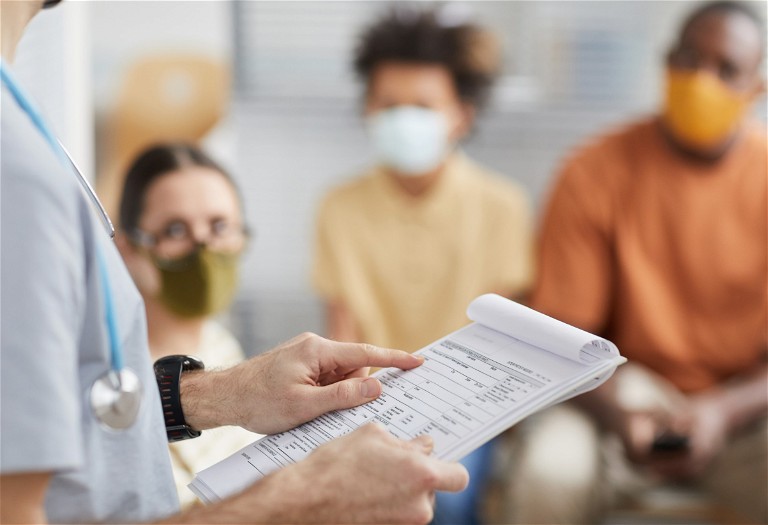ONCOLOGY
NHS waiting lists: the second healthcare crisis?
Roland Kreissig, Oncology General Manager at Novartis UK and Ireland, sits down with Pharmafile to discuss how COVID-19 affected patient access to cancer treatments, and how pharma can support the NHS to face this challenge
Pharmafile: What challenges have the NHS faced in providing cancer treatments to patients over the last couple of years?
Roland Kreissig: The last couple of years have provided endless challenges to patients and NHS staff – and we have all heard about increased waiting times and pressure across the healthcare system. As we learn to live with the realities of a post-COVID-19 world, we now face a second healthcare crisis, in which millions of people are waiting for NHS treatment. When thinking specifically about cancer care, every point along a patient’s journey through treatment has been affected by the pandemic – from delayed diagnoses, cancelled or postponed appointments, and concerns about coming into hospital for treatment, side effects, and follow-up. Cancer Research UK has been collecting data about what these delays really look like for patients, and they provide insight into the scale of the issue. They found that screening – crucial for early diagnoses in many cancers, like breast, bowel, and cervical – went down significantly in 2020/2021 when compared with 2018/2019, both in terms of those being invited, and those participating. In breast cancer, for example, the number of invitations was down 22%, and the number participating was down 33%, equivalent to almost 600,000 women. 1This same trend was seen in people waiting over six weeks for a diagnostic test, where in radiology the waiting in November 2021 was 16 times higher than pre-pandemic, with almost 200,000 patients waiting for their diagnostic test. 1
Even as we move back towards a ‘normal’ way of working, we all need to remember that the pressure on the NHS resulted in shifting and juggling priorities, with many patients waiting in the background for their turn. This backlog for appointments, tests, and procedures will continue to be felt across the country, with some estimating it could take until 2033 for the backlog to clear.2
The NHS will need to manage this backlog, while also progressing and improving care for the future. From the perspective of a pharma company, there was also a need to adapt clinical trials so we could continue to develop treatments and go through approval processes, despite the massive changes in healthcare. This challenge will require bold solutions, close collaboration, and exciting innovation, to ensure cancer patients are receiving the care they need, when they need it.
At Novartis, we believe we are strongly positioned to help the NHS recover, during a time when collaboration is more important than ever. We have been working very closely with partners across the life sciences ecosystem to identify individual issues hindering the delivery of treatments, and to offer tangible solutions to address these to support patients and the NHS.
How can pharma companies support the NHS cancer backlog and improve patient access to cancer treatments as we continue to live with COVID-19?
The NHS has been leading the charge in the UK through the pandemic, dealing with unprecedented pressures, and looking to staff to fill many roles to keep clinics and services running. But if COVID-19 has taught us anything, it’s that if we are to bring about real change, we must collaborate like never before. Those in the private sector, including pharma companies, must provide the necessary tools and support to the NHS, giving frontline staff more resources to focus on their growing patient lists whilst also looking ahead to deliver for the patients of tomorrow.
These private-public collaborations are an opportunity for organisations with invaluable knowledge, technology, and resources to be used in collaboration with the NHS to support the backlog and help with innovation of care. At Novartis, our digital innovation lab, Novartis BIOME, identifies digital and data-led solutions to reimagine medicine for the better, and ensure no patient is left behind. For example, our newly-launched Evidence Lab has been set up through our Biome digital innovation programme to work within the health system and with health tech innovators, to test and validate digital health solutions, to see what the system would benefit from most, before investment in full-scale implementation.
What developments and innovations do you think will make the biggest difference to the NHS’ cancer care in the coming years?
The NHS has ambitious goals for providing improved care for patients, and as it is currently developing a 10-year plan for how it will tackle the biggest challenges in cancer care, we are pleased that Novartis has been able to actively participate in this process by providing our recommendations. It’s an opportunity for all players in the UK cancer space to reflect on our priorities for the future.

At Novartis, we plan to continue supporting the NHS by prioritising innovation across the patient pathway. As we move towards more personalised care, we see a real opportunity to radically reform cancer diagnosis. New diagnostics, innovative technologies, and genomics, can all support patients to reach a more accurate and faster diagnosis. This will in turn enable patients to access new treatment options, including personalised and targeted medicine.
Digital health solutions will become an important tool to not only speed up the diagnostics process, but also help track disease progression and symptom burden, empowering patients to be more engaged with their clinician and treatment decisions. For example, the myeloproliferative neoplasms (MPN) Tracker, introduced by Novartis, helps people living with MPNs to recognise symptoms, regularly track them, and start a conversation with their doctor. Additionally, by harnessing health data, we can ensure interventions can be both targeted and informed by behavioural insights, to ensure that they have the biggest impact on diagnosis. Moving forward, the health system must work to improve the accessibility and integration of health data across the treatment and care pathway, from clinical research, to cancer outcomes, and quality of life.
What lasting changes has COVID-19 had on the treatment of cancer?
With the rapid development of COVID-19 vaccines, we have seen the power of public/ private partnerships in addressing public health issues. We can now take the lessons learned through this process and apply them to improving care for cancer patients, to address the lasting changes of COVID-19.
For example, the long-term challenges in the treatment of cancer go beyond the immediate backlog of care that we are experiencing now. Not only do existing patients need to be treated, but there are new diagnoses and late presentations that need addressing simultaneously.
One way this is being addressed currently is through appointments being made digital, to provide easier and quicker access to HCPs. However, with more appointments moving online, how can we ensure communication remains at a high enough standard? This is an opportunity for private organisations to support the NHS with new and innovative solutions aimed at improving telehealth, so people have access to the same quality of care while speeding up the process.

Roland Kreissig is Oncology General Manager for Novartis UK and Ireland. He joined Novartis UK in January 2022, prior to which he held the position of Oncology General Manager for Central Europe.